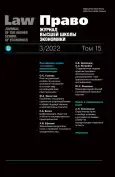Constitutional Foundations for Understanding Criminal Punishment in the System of Measures to Counteract Crimes
- Authors: Guzeeva O.1
-
Affiliations:
- Arbitration Court of the Moscow Region
- Issue: Vol 15, No 3 (2022)
- Pages: 4-27
- Section: Russian Law: Condition, Perspectives, Commentaries
- URL: https://journal-vniispk.ru/2072-8166/article/view/318184
- DOI: https://doi.org/10.17323/2072-8166.2022.3.4.27
- ID: 318184
Cite item
Full Text
Abstract
Restricting human rights and freedoms in order to prevent the commission of crimes is one of the most important and difficult directions of the state’s legal policy. Here intersect, on the one hand, constitutionally significant requirements regarding the grounds for limiting human rights and on the other hand, criminological postulates about the desirability of early crime prevention at the pre-criminal stage; constitutional ideas about the strict limits of human rights restrictions and criminological evidence of the need to control the behavior of a person at the post-criminal stage; standards of limiting the rights of a person who committed a crime, only within the framework of criminal law and the need to impose other legal sanctions on him outside of criminal law. These contradictions create an integral complex of problems of legal regulation, including discussions about the types, purposes, grounds of legal restrictions and their constitutional admissibility. Based on the analysis of the decisions of the Constitutional Court of the Russian Federation, the provisions of normative legal acts, the article presents the author’s reasoning about the system of law-restrictive measures to counter crimes. Such a system includes: measures applied at the pre-criminal stage, procedural measures, measures of criminal punishment, measures of a criminal-legal nature, measures applied at the post-criminal stage, non-criminal consequences of committing crimes. With regard to each group of measures, the legal positions of the Constitutional Court of the Russian Federation are determined, the observance of which allows, on the one hand, to coordinate all these measures in a single set of legal restrictions, and on the other hand, to very clearly oppose them to each other in order to avoid violation of the sectoral legal nature and violation of the principle justice. Special attention is paid to the specific features of criminal punishment in the general range of legal restrictions. It has been proven that these are associated with the basis, essence and purpose of punishment. Only the punishment is the appointment precisely for the commission of a crime, expresses a moral reproach to the personality of the offender and is focused on its correction. A distinctive essential characteristic of punishment is the presence in it of a pronounced moral reproach on the part of society against the offender. Only punishment imposed specifically for the commission of a crime expresses such a concerted reproach and, therefore, is oriented towards the correction of the offender.
About the authors
Olga Guzeeva
Arbitration Court of the Moscow Region
Author for correspondence.
Email: noreply@hse.ru
ORCID iD: 0000-0002-6810-395X
Judge, Candidate of Science (Law)
References
- Antipov S.A. (2012) Constitutional basic of general part of criminal law. Moscow: Prospekt, 144 p. (in Russ.)
- Babaev M.M., Pudovochkin Yu. E. (2021) Essays in criminal risks. Moscow: Yurlitinform, 368 p. (in Russ.)
- Duyunov V.K. (1997) Punishment in Russian criminal law: constraint or penalty? Gosudarstvo ipravo=State and Law, no. 11, pp. 61-68 (in Russ.)
- Dvoryanskov I.V. (2005) Efficiency of alternate punishment (compensation model'). Moscow: Yuniti-Dana, 96 p. (in Russ.)
- Dzhalgasynova G.D. (2012) Triple aiyp as a criminal penalty. Bishkek: University Press, 74 p. (in Russ.)
- Fatkhudinov A.I. (2003) Aims of punishment and regulating mechanism of its destination. Candidate of Juridical Sciences Thesis. Kazan', 185 p. (in Russ.)
- Gurin D.V. (2015) The right of a state for criminal punishment and division of powers. Biblioteka kriminalista=Library of Criminalist, no. 2, pp. 57-72 (in Russ.)
- Gurin D.V. (2014) The right of state for criminal punishment: content and forms. Biblioteka kriminalista=Library of Criminalist, no. 6, pp. 32-52 (in Russ.)
- Gurinskaya A.L. (2018) Anglo-American model of preventing crimes: critical analysis. Saint Petersburg: RGPU Press, 400 p. (in Russ.)
- Kurganov S.I. (2008) Penalty: legal and criminogical aspects. Moscow: Prospekt, 191 p. (in Russ.)
- Mal'tsev V.V. (2007) Punishment and its setting in criminal law. Volgograd: MVD Rossii, 224 p. (in Russ.)
- Popadenko E.V., Silkin V.P. (2019) From punishment approach to rehabilitation. Vestnik Nizhegorodskoi akademii MVD Rossii=Herald of Nizhny Novgorod Academy of Interior, no. 4, pp. 205-210 (in Russ.) DOI: https://doi.org/10.36511/2078-5356-2019-4-205-210
- Tagantsev N.S. (1902) Russian criminal law. Lectures. Saint Petersburg: University, 823 p. (in Russ.)
- Zhalinskyi A.E. et al. (2011) Criminal law. Moscow: Gorodets, 863 p. (in Russ.)
- Zvecharovskii I.E. (1999) Criminal law measures. Zakonnost'=Legality, no. 3, pp. 36-39 (in Russ.)
Supplementary files








